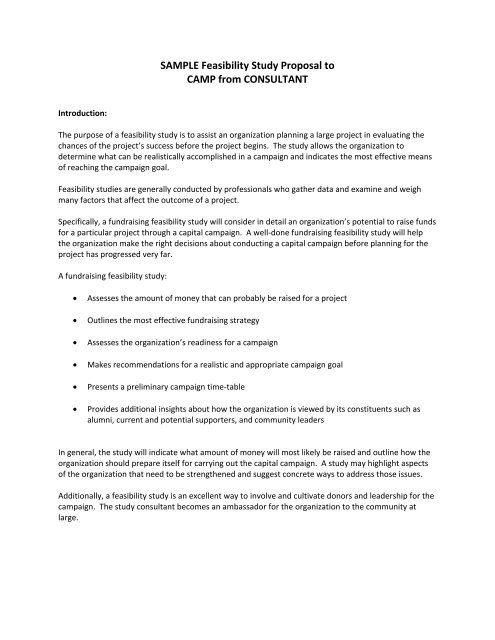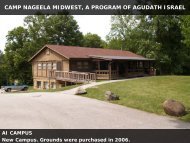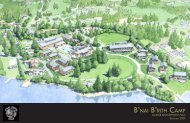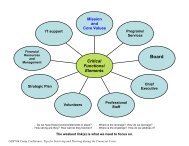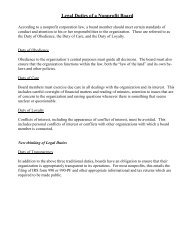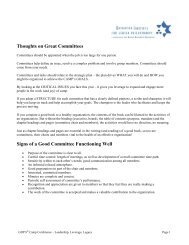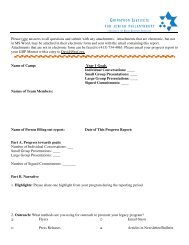SAMPLE Feasibility Study Proposal to CAMP from ... - JCamp 180
SAMPLE Feasibility Study Proposal to CAMP from ... - JCamp 180
SAMPLE Feasibility Study Proposal to CAMP from ... - JCamp 180
Create successful ePaper yourself
Turn your PDF publications into a flip-book with our unique Google optimized e-Paper software.
<strong>SAMPLE</strong> <strong>Feasibility</strong> <strong>Study</strong> <strong>Proposal</strong> <strong>to</strong><br />
<strong>CAMP</strong> <strong>from</strong> CONSULTANT<br />
Introduction:<br />
The purpose of a feasibility study is <strong>to</strong> assist an organization planning a large project in evaluating the<br />
chances of the project’s success before the project begins. The study allows the organization <strong>to</strong><br />
determine what can be realistically accomplished in a campaign and indicates the most effective means<br />
of reaching the campaign goal.<br />
<strong>Feasibility</strong> studies are generally conducted by professionals who gather data and examine and weigh<br />
many fac<strong>to</strong>rs that affect the outcome of a project.<br />
Specifically, a fundraising feasibility study will consider in detail an organization’s potential <strong>to</strong> raise funds<br />
for a particular project through a capital campaign. A well‐done fundraising feasibility study will help<br />
the organization make the right decisions about conducting a capital campaign before planning for the<br />
project has progressed very far.<br />
A fundraising feasibility study:<br />
<br />
<br />
<br />
<br />
<br />
<br />
Assesses the amount of money that can probably be raised for a project<br />
Outlines the most effective fundraising strategy<br />
Assesses the organization’s readiness for a campaign<br />
Makes recommendations for a realistic and appropriate campaign goal<br />
Presents a preliminary campaign time‐table<br />
Provides additional insights about how the organization is viewed by its constituents such as<br />
alumni, current and potential supporters, and community leaders<br />
In general, the study will indicate what amount of money will most likely be raised and outline how the<br />
organization should prepare itself for carrying out the capital campaign. A study may highlight aspects<br />
of the organization that need <strong>to</strong> be strengthened and suggest concrete ways <strong>to</strong> address those issues.<br />
Additionally, a feasibility study is an excellent way <strong>to</strong> involve and cultivate donors and leadership for the<br />
campaign. The study consultant becomes an ambassador for the organization <strong>to</strong> the community at<br />
large.
A feasibility study cannot be successfully undertaken before a general plan and clear outline of the<br />
project has been developed. Before a study is undertaken, the following aspects of the project should<br />
be known:<br />
<br />
<br />
<br />
<br />
<br />
<br />
<br />
What does the project accomplish<br />
How will the project be realized<br />
When will it be completed<br />
How much will it likely cost<br />
How will it be paid for<br />
What is the campaign goal<br />
Who are the key individuals on whom the success of the project depends<br />
Generally, answers <strong>to</strong> the above questions are included in an initial draft of the project’s Case for<br />
Support, a concise document that describes the community needs an organization intends <strong>to</strong> address<br />
with the money it raises and a plan <strong>to</strong> satisfy those needs.<br />
The <strong>Proposal</strong>:<br />
Consultant proposes <strong>to</strong> conduct a Fundraising <strong>Feasibility</strong> <strong>Study</strong> (the <strong>Study</strong>) for <strong>CAMP</strong> (<strong>CAMP</strong>) in the<br />
months of July – Oc<strong>to</strong>ber 2011.<br />
The <strong>Study</strong> will evaluate:<br />
<br />
<br />
<br />
<br />
<br />
<br />
<strong>CAMP</strong>’s reputation in the community<br />
Effectiveness and reputation of the <strong>CAMP</strong> Executive Direc<strong>to</strong>r<br />
Strength and giving potential of the <strong>CAMP</strong> Board of Direc<strong>to</strong>rs<br />
Willingness of the board and volunteers <strong>to</strong> work on the campaign<br />
Size and depth of the donor database<br />
Potential for lead gifts<br />
The <strong>Study</strong> will answer the following questions:<br />
<br />
<br />
<br />
<br />
<br />
<br />
<br />
<br />
<br />
<br />
<br />
<br />
Is the project perceived as important in the community<br />
Does the project make sense<br />
Are the plans appropriate for <strong>CAMP</strong> and the community<br />
Does the project have a strong chance of succeeding<br />
Will major donors in the community lend their support <strong>to</strong> this project<br />
How much is <strong>CAMP</strong> likely <strong>to</strong> raise for the project<br />
Who are the key people whose participation is crucial for success<br />
What are the best approaches and strategies for success<br />
Is there sufficient staff <strong>to</strong> conduct a campaign properly<br />
How much is the campaign likely <strong>to</strong> cost<br />
What is a reasonable timeline for the campaign<br />
What must <strong>CAMP</strong> do <strong>to</strong> get ready for the campaign
The <strong>Study</strong> includes three major stages:<br />
1. <strong>Study</strong> Groundwork ‐ development and review of materials and <strong>CAMP</strong> internal operations including:<br />
Case for Support<br />
Project Budget<br />
Table of Gifts<br />
Donor Database<br />
By‐laws<br />
Board minutes<br />
Alumni Activities<br />
Financial Statement and Audits<br />
Marketing materials – annual report, brochures, collateral pieces<br />
2. Information Gathering<br />
Preparing interview questions<br />
Develop subject list<br />
Scheduling interviews<br />
Meeting with interview subjects<br />
3. Report Preparation and Presentations<br />
Assembling and analyzing findings<br />
Presenting results <strong>to</strong> <strong>CAMP</strong> leadership team and full board<br />
Leadership Team responsibilities:<br />
In conjunction with CONSULTANT, the leadership team will:<br />
<br />
<br />
<br />
<br />
<br />
<br />
<br />
Develop Case for Support, project budget, and gift table<br />
Develop list of people <strong>to</strong> be interviewed<br />
Review questions consultant intends <strong>to</strong> ask during interviews<br />
Draft a letter <strong>to</strong> be sent <strong>to</strong> interview prospects prior <strong>to</strong> scheduling interviews<br />
Schedule interviews based on availability of the consultant<br />
Meet with consultant for an update around the midpoint of the interview period<br />
Review the draft report<br />
CONSULTANT responsibilities:<br />
<br />
<br />
<br />
<br />
<br />
<br />
Review Case for Support, project budget, gift table and additional items outlined in <strong>Study</strong><br />
Groundwork<br />
Review list of potential subjects<br />
Provide interview questions and prospect letter for scheduling interviews<br />
Conduct up <strong>to</strong> 30 interviews of subjects in <strong>CAMP</strong> REGION<br />
Conduct interviews outside of <strong>CAMP</strong> REGION – <strong>to</strong> be determined<br />
Present comprehensive <strong>Feasibility</strong> <strong>Study</strong> Report <strong>to</strong> the Leadership Team and Board


